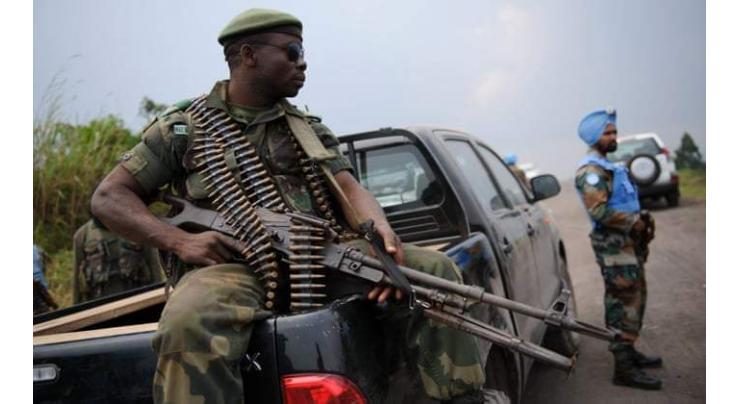
- Home
- World
- News
- Ex-UN Official Says Libya Peacekeeping Mission Should Be Carefully Thought Out If Deployed
Ex-UN Official Says Libya Peacekeeping Mission Should Be Carefully Thought Out If Deployed
Mohammad Ali (@ChaudhryMAli88) Published October 18, 2018 | 09:15 PM

The United Nations peacekeeping mission should be considered very carefully if deployed to Libya because local population still remembers the 2011 NATO intervention all too well, former UN Under-Secretary-General for Peacekeeping Operations Jean-Marie Guehenno told Sputnik.
SOCHI (UrduPoint News / Sputnik - 18th October, 2018) The United Nations peacekeeping mission should be considered very carefully if deployed to Libya because local population still remembers the 2011 NATO intervention all too well, former UN Under-Secretary-General for Peacekeeping Operations Jean-Marie Guehenno told Sputnik.
In September, Libyan Foreign Minister Mohamed Siala said that the country wanted the United Nations political support mission to be transformed into a mission that would help establish security and stability in the country. However, in October, Siala specified that he did not mean at all turning the United Nations Support Mission for Libya (UNSMIL) into a peacekeeping mission.
"My own contacts in Libya have seen that most Libyans they are wary of international intervention, in part because of the intervention in 2011 but generally speaking there is a worry, because Libya is a middle-income country with significant oil resources, so there is always a great suspicion that forces that deploy in Libya would have an interest in the riches of Libya. So I am not sure that a force would be acceptable to Libyans and if such a force would be deployed, then its composition would have to be very thought through," Guehenno said on the sidelines of the annual Valdai Discussion Club meeting in the Russian city of Sochi.
Guehenno also said that a solid political agreement between different Libyan armed groups would be the most important factor contributing to the safety and credibility of the upcoming general election in December, and the UN peacekeeping force could provide additional reassurance if deployed.
In 2011, a civil war broke out in Libya between the government forces led by the country's long-time leader, Muammar Gaddafi, and the rebels. The UN Security Council condemned the use of lethal force by the government against civilians during the war and adopted a resolution, establishing a "no-fly zone" over Libya and authorizing member states to take all the necessary measures to protect civilians. After the adoption of the resolution, NATO member countries launched a military intervention in the country, carrying out airstrikes and organizing a naval blockade. Gaddafi was eventually overthrown and killed.
The country is currently divided between two governments, with the eastern part of Libya controlled by the parliament elected in 2014 and backed by the Libyan National Army. The UN-backed Government of National Accord governs Libya's western parts.
The general election is scheduled to be held in the country on December 10.
Related Topics
Recent Stories

Experts raise concerns over introduction of 10-stick packs

Iranian president arrives in Karachi

Law Minister expresses Govt's resolve to address issue of missing persons

Rizwan’s batting order may be changed: Sources

Nawaz Sharif to visit Guangzhou exhibition in China

FM Dar not traveling to China: Foreign Office

PM takes notice of deliberate delay in tax cases

Iranian President visits Allama Iqbal’s mausoleum

Iranian President arrives in Lahore today

Currency Rate In Pakistan - Dollar, Euro, Pound, Riyal Rates On 23 April 2024

Today Gold Rate in Pakistan 23 April 2024

Islam enlightened world with its teachings about knowledge: Dr Jamileh
More Stories From World
-
French artist JR downsizes at Venice Biennale with Orient Express
33 minutes ago -
Umrah & Ziarah Forum 2024: A gateway to enhance pilgrimage services in Holy land
43 minutes ago -
16 dead, 28 missing in migrant boat capsize off Djibouti: UN
43 minutes ago -
16 dead, 28 missing in migrant boat capsize off Djibouti: UN
1 hour ago -
How UK's biggest water supplier sank into crisis
1 hour ago -
EU lawmakers greenlight new rules to rein in national spending
2 hours ago
-
Hamas to stay in Doha if 'useful' for Gaza war mediation: Qatar
2 hours ago -
London stock market strikes record as sentiment lifts globally
2 hours ago -
In Brazil, hopes to use AI to save wildlife from roadkill fate
3 hours ago -
Taiwan hit by dozens of strong aftershocks from deadly quake
3 hours ago -
Ambassador Hashmi visits Linyi city in Shandong province
4 hours ago -
Norway women bring seaweed to culinary heights in Europe
4 hours ago